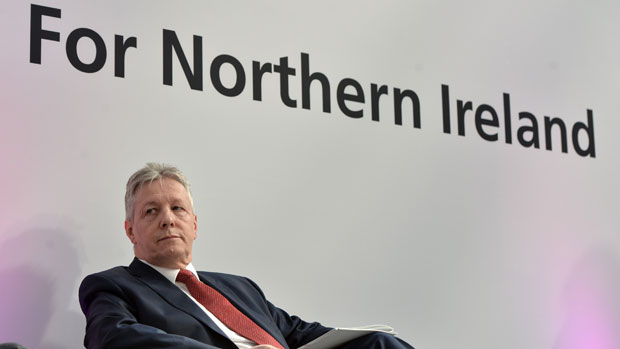Why the DUP could hold the balance of power
The Democratic Unionist Party is ready to do a deal with either Labour or the Conservatives – but at what cost?

A free daily email with the biggest news stories of the day – and the best features from TheWeek.com
You are now subscribed
Your newsletter sign-up was successful
With a hung parliament looking increasingly likely after next week's general election, many are predicting that Northern Ireland's Democratic Unionist Party could end up holding the balance of power.
Despite not being allowed to take part in the TV debates – even though they have more MPs than Ukip, Plaid Cymru, the SNP and the Greens – the party could be "the Downing Street king-makers" predicts the BBC's Mark Simpson.
The fourth largest party in the UK has never been in a position where it could decide on the next Westminster government, but has signalled it is ready to do a deal with either Labour or the Conservatives – if the price is right.
The Week
Escape your echo chamber. Get the facts behind the news, plus analysis from multiple perspectives.

Sign up for The Week's Free Newsletters
From our morning news briefing to a weekly Good News Newsletter, get the best of The Week delivered directly to your inbox.
From our morning news briefing to a weekly Good News Newsletter, get the best of The Week delivered directly to your inbox.
The DUP manifesto
The party describes itself as "right-wing in the sense of being strong on the constitution", but "to the left on social policy". Some of the key policies from their manifesto:
- On immigration and the EU, the party proposes introducing tougher border controls and calling for a referendum on the country's EU membership. "Free movement of labour does not have to entail free access to benefits paid for by other countries' taxpayers," it says.
- In terms of the economy, it wants to cut the deficit and increase the personal tax allowance to 12,500, as well as raising the minimum wage.
- It believes that UK defence spending should not fall below 2 per cent of GDP to ensure that the armed forces are capable of tackling multiple deployments.
- The party is fierce critic of the government's bedroom tax, arguing that it has had "inhumane and ineffective" consequences.
- It proposes freezing, then cutting or abolishing the TV licence and reforming the BBC.
Controversies
"Name any prejudice, and the DUP are probably guilty of it," writes Siobhan Fenton in The Independent. "The far-right political party [holds] as core values distrust and disgust of anyone who isn't a white, Northern Irish, Protestant male."
A free daily email with the biggest news stories of the day – and the best features from TheWeek.com
Last year, the party's leader Peter Robinson supported a protestant minister who described Islam as "satanic" and a "doctrine spawned in hell". The party's current MP Ian Paisley Jnr infamously shouted "moo moo moo" to stop a female politician from voicing her opinion on the peace process.
Homophobia is also "deep-rooted" within the party, argues Federica Cocco in the Daily Mirror. The party's founder, Ian Paisley lobbied against the decriminalisation of homosexuality, while his son has said he was "repulsed" by gay people.
The party is planning to introduce a "conscience clause" into aspects of equality law which critics argue would effectively legalise discrimination against the LGBT community by giving businesses the right to refuse to serve gay people.
The party is vehemently anti-abortion – even in cases of rape, incest or fatal foetal abnormalities. It is also pro-death penalty, in favour of creationism be taught in schools and has advocated "rigorously enforce legislation against begging".
Its role in a future coalition
The DUP, which held eight seats in the last parliament, is projected to win nine or ten in next week's election, a number which could prove pivotal in forming a new government.
The party has ruled out a formal coalition, but says it will be willing to informally support a party "whose proposals taken as a whole are in the best interests of Northern Ireland in particular and the Union as a whole".
It has ruled out sitting in a coalition with the Scottish National Party, but would be open to offers from the two main parties. "After the election we are prepared to support either the Conservative Party or the Labour Party if the circumstances are right; or for that matter neither if the circumstances are not right," its leader Peter Robinson told the BBC.
So what are their demands? Deputy leader Nigel Dodds outlined what his party wants in a recent article in The Guardian. He indicated that that he would be unwilling to compromise on its key policies on defence, abolishing the bedroom tax and protecting the UK's borders.
David Cameron has refused to rule out coalition with them, with some suggesting a Tory/DUP/Ukip agreement could be on the cards. Such a coalition would mean the "hard right" would have more political influence over the national government than at any other point in post-war British history, Owen Jones points out in The Guardian.
"The idea of these bigoted throwbacks to several centuries ago holding the balance of power should surely frighten even moderate Tories, let alone the rest of us," he argues. Nick Clegg has also repeatedly warned against a right-wing alliance – one he has dubbed "Blukip".
Although the party is considered by some to be a natural partner to the Conservatives and Ukip, the DUP hasn't ruled out a coalition with Labour. Their policies on abolishing the bedroom tax, cracking down on tax evaders and refusing to support a rise in VAT overlap with Ed Miliband's pledges.
"If the DUP threw its weight behind a prospective Labour government,” says the Daily Telegraph, "it could lock David Cameron out of Downing Street."